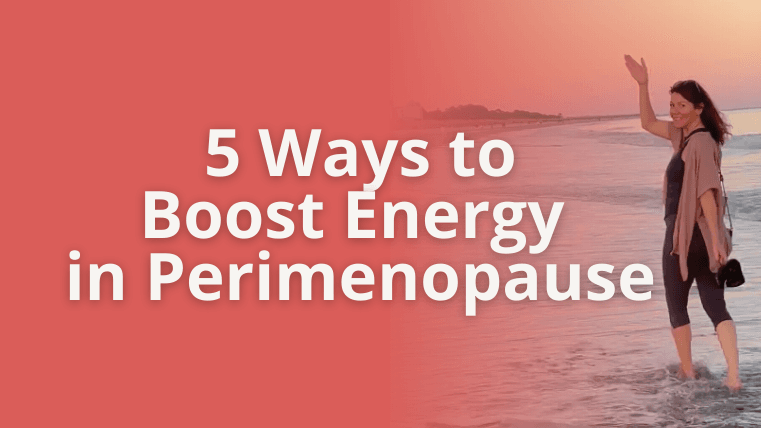5 Quick Ways to Boost Energy
in Perimenopause
You Deserve to Have More Energy in Perimenopause
Do you feel like your energy has been hijacked in your 40s? Many women in perimenopause describe waking up groggy, hitting a mid-afternoon wall, or feeling “wired but tired” at night. These energy swings are not in your head — they’re rooted in the hormonal shifts of perimenopause.
As estrogen and progesterone begin to fluctuate, your body’s ability to regulate blood sugar, cortisol (stress hormone), and metabolism changes. Add in the demands of daily life, and fatigue can feel like the “new normal.”
The good news? You don’t need another crash diet, endless coffee, or a stricter routine to feel better. Instead, simple daily routines that support your hormones, nervous system, and metabolism can help you restore steady energy — and feel more like yourself again.

Here are 5 quick, practical tips to boost energy naturally during perimenopause.
1. Start Your Morning With Light + Protein
Why it matters: Cortisol naturally peaks in the morning to wake you up. But if you skip sunlight exposure or start with a sugary breakfast, your circadian rhythm gets confused — leading to grogginess now and fatigue later. A protein-rich breakfast helps stabilize blood sugar, preventing mid-morning crashes that are especially common in perimenopause.
Try this: Step outside for 5–10 minutes of natural light first thing in the morning (even if it’s cloudy). Then, eat a balanced, protein-rich breakfast such as:
- A veggie omelet with avocado
- Greek yogurt with chia seeds and berries
- A smoothie with protein powder, leafy greens, and nut butter
2. Take a Mid-Morning Movement Break
Why it matters: If you sit most of the day, your blood sugar and circulation can dip, leading to sluggishness. In perimenopause, declining estrogen makes your body less efficient at regulating energy from food. Movement — even in short bursts — helps lower cortisol, improve insulin sensitivity, and sharpen focus.
Try this:
- Walk outside for 5–10 minutes after your mid-morning snack.
- Stretch at your desk or try 2–3 gentle yoga poses.
- Use movement as a “reset button” — not a workout, just a signal to your body that it’s time to stay energized.
3. Balance Your Lunch Plate + Don’t Skip Snacks
Why it matters: By lunchtime, many women are already running on empty. A heavy carb-based lunch (like pasta, sandwiches, or chips) spikes blood sugar, leading to an afternoon crash. On the other hand, skipping snacks or pushing too long between meals can spike cortisol. This stress response may give you a short-term “push,” but it sets you up for fatigue, sugar cravings, and even disrupted sleep later.
Try this:
- At lunch, aim for ½ vegetables, ¼ protein, ¼ smart carbs (like quinoa, lentils, or sweet potato).
- Add healthy fats (avocado, olive oil, nuts) for sustained energy.
- Include a mid-afternoon snack if you notice energy dips: apple with almond butter, hummus with veggies, or a boiled egg with a handful of seeds.
Supporting your blood sugar throughout the day = preventing perimenopause fatigue.
4. Create a Calm Afternoon Reset
Why it matters: Around 3 PM, cortisol can spike again — especially if you’ve been running on stress and caffeine. This “wired but tired” feeling makes you crave sugar or coffee. Supporting your nervous system with calm, not stimulation, helps break the fatigue cycle.
Try this:
- Step away from your screen for 5–10 minutes.
- Practice deep breathing, guided meditation, or journaling.
- Swap afternoon caffeine for calming teas like chamomile, rooibos, or tulsi.
Even a short nervous system reset can lower cortisol, reduce cravings, and help you carry energy into the evening without the crash.
5. Protect Your Evening Routine for Better Sleep
Why it matters: Restorative sleep is one of the biggest energy challenges during perimenopause. Hormone fluctuations often lead to night sweats, 3 AM waking, or restless sleep. Without quality rest, no amount of coffee or supplements will restore your energy.
Try this:
- Dim lights after dinner to signal melatonin production.
- Shut down screens 60 minutes before bed (blue light disrupts sleep hormones).
- Avoid late-night snacks, alcohol, or heavy meals.
- Consider magnesium glycinate or calming herbal teas if sleep is a struggle.
- Sleep is when your body rebalances cortisol, repairs tissues, and resets energy — making it the foundation of your daily vitality.
Perimenopause doesn’t have to be a struggle that leaves you exhausted.
With a few simple but powerful daily shifts you can boost energy naturally and feel more in control of your health.
These aren’t quick fixes. They’re the building blocks of hormone balance, steady energy, and long-term vitality in midlife.
Ready to Feel Like Yourself Again?

Feeling drained, moody, or stuck with stubborn weight gain? You don’t have to figure it out alone.
I’m Jessica Lee Reader, a Master Nutrition Therapist and Yoga Teacher with 15+ years of experience helping women in perimenopause and menopause restore energy, mood, and metabolism with holistic nutrition and nervous system support.
Book your free 15-minute consultation, and let’s talk about your symptoms and how I can help you.
